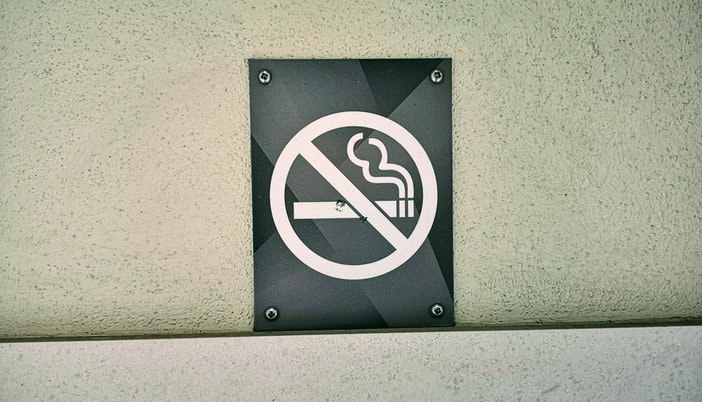Are Cigarettes Considered Vegan in the UK?
As veganism continues to soar in popularity in the UK, many of us are finding ourselves questioning whether various products we’ve always been accustomed to are vegan or not.
Sometimes the answer is a surprising ‘yes’, and sometimes it is an equally surprising ‘no’; and more often than not, there are shades of grey. But what about cigarettes? Generally, cigarettes are not considered vegan. Here’s why….
As an Amazon Associate, I earn from qualifying purchases. The links below may be affiliate links. Please read my disclosure policy for more information.
Are Cigarettes Vegan?
Although the main component of most cigarette products is the tobacco plant, there are still a few ingredients within cigarettes that do not sit well with many vegans.
Some of these include:
[Please note: cigarette manufacturers are notoriously private about all of the ingredients within cigarettes, so the information below is not exclusive to all products included within cigarettes – just the ones companies are transparent about.]
Haemoglobin
Occasionally, haemoglobin is used in the manufacture of cigarette filters. Haemoglobin is a blood pigment found in the red blood cells of vertebrates of mammals, and in the case of cigarette production, is generally obtained from pigs’ blood.
The substance is supposed to support the filter element that protects the user from pollutants from the smoke of the cigarette.
Shellac
Shellac is occasionally found as an adhesive in some cigarettes. Shellac is made from rubber varnish, which is from the excretions of the scales of the insect Kerria lacca, and is obtained after sucking on certain plant species.
Beeswax
Many cigarette manufacturers are very guarded about the ingredients that go into cigarettes, and cigarette packaging is generally too small to fully list the ingredients (how convenient!), but beeswax is generally considered a key ingredient within many cigarettes.
Other Issues with Cigarettes & Veganism

Animal Testing
The cigarette industry is one of the most notoriously cruel industries due to it’s long-standing testing of its products on animals, which include forcing prolonged exposure of smoke to “lab” animals.
Environmental Reasons
Naturally, the tar in cigarettes is not good for the environment. So, on the mass scale that smoking occurs across the globe, cigarettes are causing a negative impact on the environment.
There is also the issue of cigarette butts generally being non-biodegradable. And when carelessly discarded, are often confused as bits of food by various animals, such as birds, fish, ducks, hedgehogs, etc.
Are there Any Cruelty-Free Cigarettes Available in the UK?
The good news is if you’re not ready to quit yet, there are a few vegan (no animal components nor tested on animals) cigarette brands now on the market, including:
- West
- Davidoff
- Gauloises
- Manila
- Brookfield
- Black Hawk
- Dockers
- JBR
- Red Bull
- Denim
- Allure
- Route 66
- Turner
The brands still not vegan, and should be avoided, are as follows:

- Samson
- Lucky Strike
- Westpoint
- Winchester
- Camel
- Chesterfield
- Optima
- Boston
- Kent
- Memphis
- Dunhill
- Pall Mall
Are e-Cigarettes Vegan?
The good news is most e-cigarettes are vegan. This may vary from brand to brand and is worth double-checking the ingredients of your vape mist of choice.
Healthy Vegan Substitutes to Cigarettes/Vapes
CBD
CBD extract (the oil from the hemp plant) is entirely vegan, but different companies combine it with various blends or ‘flavours’ of oils, colours and flavourings. Most reputable CBD brands will only include a high-quality carrier oil like olive oil, hemp seed oil or MCT oil.
However, you should always carefully check the label to ensure the product is fully vegan.
The Origin of Tobacco

“Tobacco is the Western name of several plants in the genus Nicotiana of the family Solanaceae, and the general term for any product prepared from the cured leaves of these plants. More than 70 species of tobacco are known, but the chief commercial crop is N. tabacum.
The more potent variant N. rustica is also used in some countries.
Dried tobacco leaves are mainly used for smoking in cigarettes and cigars, as well as pipes and shishas. They can also be consumed as snuff, chewing tobacco, dipping tobacco and snus.
Tobacco contains the highly addictive stimulant alkaloid nicotine as well as harmala alkaloids. Tobacco use is a cause or risk factor for many deadly diseases, especially those affecting the heart, liver, and lungs, as well as many cancers.
In 2008, the World Health Organisation named tobacco use as the world’s single greatest preventable cause of death.
Tobacco has long been used in the Americas, with some cultivation sites in Mexico dating back to 1400–1000 BC. Many Native American tribes traditionally grow and use tobacco.
Historically, people from the Northeast Woodlands cultures have carried tobacco in pouches as a readily accepted trade item. It was smoked both socially and ceremonially, such as to seal a peace treaty or trade agreement.
In some Native cultures, tobacco is seen as a gift from the Creator, with the ceremonial tobacco smoke carrying one’s thoughts and prayers to the Creator.” (Source: Wikipedia)
What is Nicotine?
Nicotine is a naturally produced alkaloid in the nightshade family of plants (most notably in tobacco) and is widely used recreationally as a stimulant drug, which both stimulates and relaxes the user.
Nicotine constitutes approximately 0.6–3.0% of the dry weight of tobacco, and is considered one of the most addictive drugs in the world; even more so than substances such as alcohol and heroin.
Quitting Smoking

Vegan issues aside, smoking is incredibly bad for our health, mainly because of the tar found in cigarettes, which can lead to many health issues such as Emphysema and lung cancer.
Moving away from nicotine intake can be a difficult process for many. To get help and advice with quitting smoking, please visit the NHS’s stop smoking page.
Conclusion
So, we have learned that cigarettes are largely considered not vegan-friendly. This is due to several of their known ingredients, such as beeswax.
The tobacco industry is notorious for its long-standing relationship with the cruel process of testing cigarettes on animals, which is a big red flag for many vegans. However, there are now a handful of cigarette manufacturers (see above) that have created cruelty-free cigarettes.
Smoking is incredibly bad for both our own health and wellbeing, the health and wellbeing of those around us (including our furry friends) and the environment, so packing up smoking will be hugely beneficial.





